| |
"I knew that through Carlos I could deal with the history of a generation....and also how during a generation's lifetime the world has changed and how one character carried, pushed by history, ended up crushed by it." |
| |
Director Olivier Assayas* |
| |
"I am a soldier! I am not a martyr!" |
| |
Ilich Ramírez Sánchez |
Terrorism ain't what it used to be. In an age when we are encouraged to be paranoid about terrorism – it has often been said that if you keep people scared and you can get them to agree to anything – it must be hard for some to imagine a time when the notion that one person's terrorist is another person's freedom fighter actually had meaning. Back in the politically turbulent 60s and 70s, many of those wearing the terrorist label were motivated by ideology rather than religious fanaticism, and while we may not always have agreed with their methods, we could at least sympathise with their cause and even raise a small fist to their rhetoric.
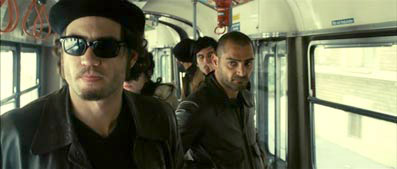
It may seem an odd thing to suggest, but there seems to be something of a nostalgia for old-school, ideology-driven terrorism at the moment, at least amongst European filmmakers. In recent years we've had documentary portraits of the Basque separatist movement ETA in Julio Medem's information-packed The Basque Ball: Skin Against Stone, and of controversial lawyer Jacques Vergès in Barbet Schroeder's Terror's Advocate, whose clients included the Algerian FLN, a group who fought for independence in an armed struggle against the French nation. More recently, we've been treated to Mesrine, Jean-François Richet's two-part dramatic portrait of notorious French criminal and self-proclaimed anarchist revolutionary Jacques Mesrine, and Uli Edel's The Baader Meinhof Complex, which explored the rise and fall of Germany's Red Army Faction. These films seem to have struck a chord with audiences as well, suggesting that this fascination extends beyond the musings of a few artistic intellectuals. Mind you, I would imagine a few of those facing redundancy and potential poverty due to mismanagement and greed in the financial sector would secretly relish the prospect of seeing a few bankers and company bosses executed for the crimes of capitalism. Hell, I'm getting all warm at the very idea.
It has to be said that as international terrorists go, Venezuelan Ilich Ramírez Sánchez had more than his share of notable misfires. Having established himself as a guerrilla fighter of some repute, he botched the planned assassination of Joseph Sieff, the then chairman of Marks & Spencer and vice president of the British Zionist Federation. He then attempted to bomb the London branch of the Hapoalim Bank of Israel, but the bomb fell short of its target and only the detonator exploded. In 1975 he participated in two separate rocket attacks on El Al planes at Orly Airport near Paris. The missiles twice missed their target in the first attack and the second attempt was foiled before even a single rocket was launched. In 1982 he masterminded a plan to blow up a French nuclear plant with grenades. Want to guess how that went? But this is only half the story. He also shot and killed two French detectives who tried to arrest him, carried out a number of successful bomb attacks on western targets, and led a six-person assault on the OPEC headquarters in Vienna that resulted in three deaths and the holding of over sixty hostages. For years he was considered one of the world's most wanted yet elusive criminals.
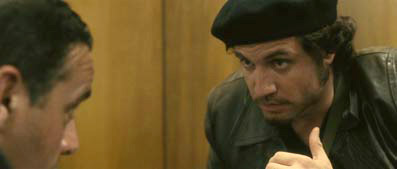
Sánchez is, of course, more widely known by his chosen code name, Carlos, or as he came to be dubbed, Carlos the Jackal, a moniker not of his own choosing (and which is never used once in this film) but a label stuck on him by a British journalist after a copy of Frederick Forsyth's The Day of the Jackal was (mistakenly) believed to have been found amongst his belongings. A committed fighter for the PFLP (the Popular Front for the Liberation of Palestine), he played an active role in the 1971 Black September conflict and trained further in Beirut under the tutorage of the notorious Palestinian activist Waddie Haddad. It was later in his career that Carlos' star within the Middle Eastern activist movement began to fade. Two of his former comrades accused him of accepting a multi-million dollar payoff for freeing two key OPEC hostages he had been ordered to execute – Saudi Arabian oil minister Ahmed Zaki Yamani and Iranian finance minister Jamshid Amuzgar – which led directly to his expulsion from the PFLP. He went on to form his own group, the Organisation of Arab Armed Struggle, and following the arrest of his wife and fellow activist Magdalena Kopp, he reinforced his demands for her release with a string of attacks against French targets. Increasingly, he took a more supervisory role in the group's operations, and many felt that he ultimately become seduced by the power and notoriety his earlier activities had brought him, while the changing nature of world politics eventually saw once friendly nations start to turn their backs on him and safe havens becaming increasingly hard to find.
For those who do not know, Carlos (in a nice bit of irony, the film has been re-badged Carlos the Jackal in the country that came up with the Jackal moniker, but it remains simply Carlos on the film itself) grew from a single movie into a three-part TV mini-series with a 324 minute running time, and has also been re-edited down to 165 minutes for a cinema release. Both versions are being released separately on UK DVD by Optimum and in one package on Blu-ray, and while I haven't seen the cinema cut, I'd still urge any interested party to go for the full version, for the simple reason that there's nothing here I can imagine being cut out without in some way diluting the drama. This runs for five and a half hours because that's what the story needs it to be, at least if it's going to be as compellingly told and detailed as it is here. And if that length still bothers you then remember that it's no longer than the mini-series average and a lot shorter than some, and is designed to be watched in three single movie-length parts. But be warned, the manner in which the first episode concludes had me scrabbling desperately for the second DVD, despite the late hour at which I'd chosen to start watching. Yep, it really is that good.
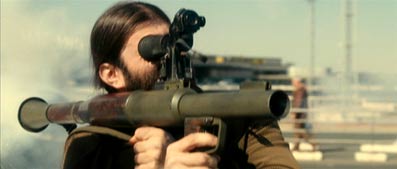
It's not hard to see what why the story proved so fascinating to its co-writer and director Olivier Assayas, a name I previously associated with personal dramas like Late August, Early September [Fin août, début septembre] (1998), Alice et Martin (1998), and the fabulous Irma Vep (1996). Offered the chance to make a film about Carlos' eventual arrest, Assayas became fascinated by the events that led up to it and returned to his producer Daniel Leconte with a different proposal, one that eventually grew into the considerably more ambitious project presented here.
A caption up front that states that although it is the result of historical and journalistic research, enough details of Carlos's life remain the product of speculation for the film to be classified as a work of fiction. It's a surprisingly honest admission, especially given that, with very few exceptions, the same is true of just about all cinematic biopics, particularly when it comes to private conversations and the specifics of personal relationships. But in the case of story elements that have been factually evidenced, the film is almost always on the historical money, right down to the casting of actors in key supporting roles who bear a striking resemblance to their real-life counterparts. And if you're looking for a figure who encapsulates the geopolitical turmoil of the 60s and 70s then Carlos is your man, linked as he was to a number of key groups and figures of the time, from the PFLP and Japanese Red Army to the German Revolutionary Cells and even our old friend Jacques Vergès, who at one point counted Carlos amongst his clients.
Bypassing his early life and his involvement with Black September, the film opens with the car-bombing of pro-Palestinian activist Mohammed Boudia by Mossad agents, the incident that prompted some of the retaliatory action detailed above. It's here that the style for the series is set, with tight and economical storytelling (Boudia quickly tucking a pistol into his trousers and giving the engine and underside of his car the once over says a lot about the risks of his daily routine) and a use of real-life news footage of the event to ground it in the reality of a specific time and place.
It's fair to say that a little knowledge of the facts goes a long way here. Carlos is accepted into the PFLP then a short while later is in London at the house of the aforementioned Joseph Sieff, and it's never explicitly stated that this soon-to-be notorious terrorist was actually a student at the Polytechnic of Central London and thus resident in the city, which is why he shares a flat there with one of the many women he became involved with during the course of his life. The assassination attempt fails when the gun jams after the first shot, a brief and breathless scene that signals the stylistic shape of things to come. The almost constantly mobile camera feels directly linked to the mood and emotion of the action it captures, the calm of dialogue exchanges and long Steadicam drifts around crowds and social functions giving way to kinetic hand-held work and an accelerated editing pace when the action hots up. This brings an urgency and tension even to scenes in which we and the characters have no emotional bond, notably when three Japanese Red Army activists invade the French Embassy in The Hague, a showpiece sequence of almost documentary realism in which every urgently grabbed and precision cut shot feels carefully organised and never the result of the current Hollywood trend for multi-camera coverage of scenes that only find any real structure in editing.
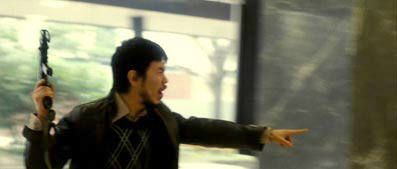
Despite the story density, it's not all pace driven, the running time allowing Assayas to include character-shaping dialogue scenes and extend others that a standard cinema feature would probably cut short. This is compellingly demonstrated when the police pay a fateful visit to Carlos' Paris apartment in Episode 1, a captivatingly launched sequence that builds its tension slowly then explodes into the violence with a shocking abruptness that sets the tone for the film's handling of gunplay, which is always brutal, realistic and stripped of any hint of action movie glamour.
The edge-of-seat ending to Episode 1 sees Carlos at pretty much his revolutionary peak, with his Che Guevara beard and beret and his team of foot soldiers, boarding a tram for the OPEC conference raid that would really put his name on the revolutionary map. The operation and its aftermath rightly dominate the second episode, and if Part 3 feels a little less urgent then it's no less compelling, appropriately reflecting Carlos's step back from the front line and the erosion of support for his dwindling group. There's a lot of ground covered in the course of the three episodes and the sheer number of fully rounded and quickly defined characters who play small but significant parts is at times almost dizzying. Introductory captions for key personnel do help here and add to the sense that we're watching a dramatised documentary, but all are supporting roles and the sheer size of the cast, coupled with the frequent locational shifts, mean that recognising them when they reappear will test your recall skills to the max – the pace gives little time for reorientation, and memory-prompting dialogue is in short supply.
With such generous screen time at his disposal, Assayas allows us to engage with Carlos through a process of growing familiarity rather than any obvious dramatic or dialogue-driven hook. It's a bit of a risk given that the film takes an unwaveringly neutral position on Carlos and activities, presenting him as neither a demon nor a misunderstood idealist, but a man whose obvious conviction and passion for his cause become clouded when he starts to believe his own press. And engage with him we do, to the extent that when he brokers a deal for the release of the OPEC hostages, I found myself sympathising just a little with lethal young Revolutionary Cell firebrand Nada's anger at what she sees as a betrayal of their mission and their stated ideals.
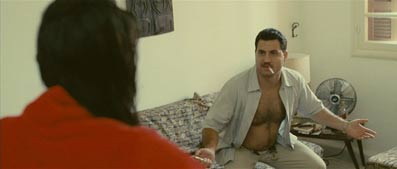
So much of why this works so well is down to a superb central performance from Venezuelan actor Édgar Ramírez, who follows his director's lead by portraying Carlos as a bold, confident, but ultimately self-absorbed man whose very real commitment is undermined not by ideological insecurities, but ordinary human weaknesses and a love of life that eventually blunts the attraction of dying for a cause. Part of the fascination with the character comes from his quiet authority and the controlled calm of his delivery, whether it be his compelling kitchen discussion with the marked-for-death Yamani or his dealings with representatives of governments willing to financially support his activities. Only rarely does he lose his cool in front of others and even at his most power-seduced he's a long way from the fiery excesses of Tony Montana and his ilk. On a technical level alone, the performance is a marvel – a total of eight languages are spoken in the course of the film, four of which Ramirez is fluent in (if Italian had been needed it would have been five), and the weight he gains during his two years in Yemen is clearly for real, registering all the more thanks to a moment of unforced narcissism early in the story where he pauses to admire his then trim physique in a mirror.
The icing on the cake is an unexpected but sublimely effective use of punk era rock tracks for montages, transitions and the build-up to conflict, while the action scenes themselves, in-keeping with the documentary overtones, play out without musical accompaniment. It's one of several elements that kick against expectations but are integrated perfectly into the dramatic whole. And despite being made for European television, this is no TV mini-series but a triumphant five-and-half hour, three-act study of terrorism, idealism and 70s geopolitics, and a fascinating biographical portrait of the rise and fall of an enigmatic revolutionary activist who never quite made it to T-shirt status.
The sense that we are watching a movie rather than a TV mini-series is enhanced by the decision to shoot on Super-35mm in 2.35:1 aspect ratio, something that would have been unthinkable before widescreen became the TV standard. At its best this is a seriously impressive transfer, the well-balanced contrast and level of detail proving that there's still plenty of life in DVD yet. The inky blacks result in a some loss of shadow detail in some darker scenes (London at night is a good example) and there is some bleaching of whites in some daylight exteriors, but this looks to be a deliberate stylistic choice and skin tones are always correctly exposed here. There is some post-production tinting at work and the colours themselves appear to have been faded as part of the (authentic) period feel. I would imagine the Blu-ray is quite something.
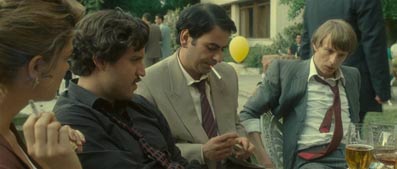
There's a choice between Dolby 2.0 stereo and Dolby 5.1 surround soundtracks and both are up to the expected standards, in the brightness of the mix and the clear frontal separation. The surround track wins out, though, for the extra base kick and the use of surround in action-driven scenes like the embassy raid and the airport escape, and for the crystal clarity and punch of the (sometimes loud) rock tracks.
All of the extras are located on disc 3.
Making-Of Featurette (20:22)
Although largely focussed on one key scene – the raid on the OPEC conference and the exit to the bus afterwards – this is a welcome look at Assayas at work and gives a flavour of how influential the known facts were on the ways scenes were staged. An interview with Assayas in which he talks about the writing and his intentions for the film intermittently pops up on the soundtrack.
Interview with Édgar Ramirez (4:38)
Ramirez talks about his preparation for the role and his intentions for the character, and reveals that one of his friends saw the film as the story of a rock star in which musical instruments have been replaced with guns. Frankly that's as neat a summing up of the film's appeal as I've yet heard.
Interview with Olivier Assayas (19:07)
A two-part interview with director Assayas, who provides a great deal of interesting background on the writing, casting and making of the film. I was heartened (and perhaps unsurprised) to hear that he refused to approach this as a television production and is clearly pissed off that some other filmmakers have labelled it as such, given that he believes a substantial portion of French films look like TV movies anyway.
A first-rate example of biographical storytelling that really should be seen in its full 330 minute version, not the simultaneously released and severely truncated 'movie' edition. Assayas deserves all the praise he gets both for his intelligent and layered script (written in conjunction with Dan Franck) and his spot-on direction, and for a central performance that should by rights catapult Édgar Ramirez onto the world stage. Either go for the Blu-ray, which has both versions and should look terrific, or the 3-disc 'Trilogy' DVD. Either way, this full version comes highly recommended.
|